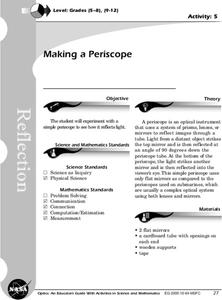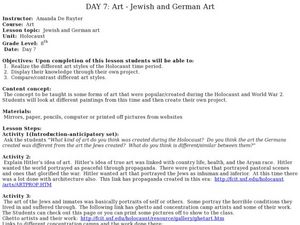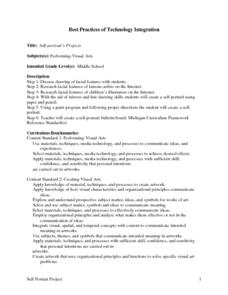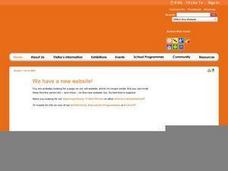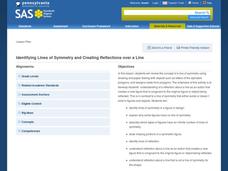Curated OER
Kaleidoscope
Students explore energy by creating a light project in class. In this kaleidoscope lesson, students discuss the properties of light and how mirrors can reflect the energy in different directions. Students view a diagram of light...
Curated OER
Monoprints With Markers
Students make prints without a printing press. In this printmaking lesson plan, students make a monoprint by drawing a picture with washable markers, briefly submerging the paper under water, and pressing it onto a new sheet.
Curated OER
Architecture
Students study tessellations and the work of M.C. Escher. They discuss the terminology of architecture, the historical significance of architecture in different parts of the world, and create their own piece of architecture out of...
Curated OER
Reflections Of
Students create angles using mirrors. In this angle reflection lesson, students draw angles, then use mirrors to create angles using reflections and measure the new angles.
Curated OER
Missing Halves
In this halves of objects worksheet, students draw the other half for the leaf, scarecrow, apple, and tree to help them understand symmetry.
Curated OER
Symmetrical Journals
Young scholars identify symmetrical shapes around their classroom and make symmetry journals. In this symmetry lesson plan, students make drawings of symmetrical shapes inside their journals.
Curated OER
Making a Periscope
Learners experiment with a simple periscope to see how it reflects light. They draw a diagram of the path a ray of light follows as it travels from an object, through the periscope, and into your eye.
Curated OER
Symmetry Project
Students explore the concept of symmetry by drawing an the other half of an object. They pick from a stack of magazine pictures and draw it on another piece of paper.
Curated OER
Using Fabrics in Your Art Curriculum
Students use a dicut machine to do block printing on fabric. In this fabric lesson plan, students draw, carve, and print onto blocks for this art project.
Curated OER
The Boy of a Thousand Faces
Students discuss what an illustrator is and illustrations help readers follow the story line. Using the illustrations, they identify the characteristics of facial proportions and draw their own face. They use glue to cover the lines...
Curated OER
Jewish and German Art
Students draw a self-portrait in pencil with shading. In this Holocaust lesson, students discover Hitler's idea of art and compare it to the art of the Jews during the Holocaust period. Students discuss reasons the art of the Jews was...
Curated OER
Self-portrait Projects
Teacher discusses drawing of facial features with students. They then research facial features of famous artists and children's illustrators on the Internet. Students then will create a self-portrait using paper and pencil.
Curated OER
Light Gathering Power
Students compare and calculate the light gathering power of lenses. They determine the ability of various lenses and mirrors to gather light.
Curated OER
Light & Colors
Students identify the types of light on the visible spectrum. They identify relationships between angles and mirrors. They state how they use light in their everyday lives.
Curated OER
Identifying Lines of Symmetry and Creating Reflections over a Line
Fifth graders review the concept of a line of symmetry by using pieces of paper that have pictures such as, letters of the alphabet, polygons, and designs made from polygons in order to determine if they have symmetry. The fine, two-hour...
Curated OER
Matching Directions
These abstract shapes are pointing in different directions and young scholars determine which ones are oriented the same way. For each of five starting shapes they examine a set of four identical figures pointing in various directions,...
Curated OER
Matching Directions
Which of these shapes is pointing the same way? Pre-readers examine five rows of familiar objects. The first item points to the right for each, and they must determine which of the subsequent items in each row points the same direction....
Curated OER
Invertebrates
Students examine invertebrates. In this animal classification instructional activity, students discuss invertebrates and bilateral symmetry. They discuss the importance of horse shoe crabs in medical science.
Curated OER
Print-Making Card Designs
Students explore print making. In this art and print making lesson plan, students listen to biographical information about Leonardo da Vinci, then define "mirror image" as a technique used by this artist. Students cut out magazine...
Curated OER
Reflections of Symmetry
Young scholars use video and the Internet to identify examples of bilateral and radial symmetry in the world around them. They create symmetrical reflection designs using pattern blocks and paper.
Exploratorium
Polarized Sunglasses
Reflected waves of light move within a plane, and because of this, polarizing materials can reduce the glare our eyes see. This resource explains how to set up a demonstration of this effect. Consider it for use in your physical science...
Mathematics Vision Project
Module 6: Congruence, Construction, and Proof
Trace the links between a variety of math concepts in this far-reaching unit. Ideas that seem very different on the outset (like the distance formula and rigid transformations) come together in very natural and logical ways. This unit...
Curated OER
Cartoons for the Classroom: Satire or Slander
Encourage your young learners to analyze and think critically about how media portrays people or events. Upper graders analyze a political cartoon depicting President Obama as a Muslim and the First Lady as a revolutionary. Guided by...
Curated OER
Friendship Masks
Students investigate the concept of friendship and how it is developed and based upon some different emotions. They examine samples of masks that display emotional responses. Then students have class discussion about emotions and the...








